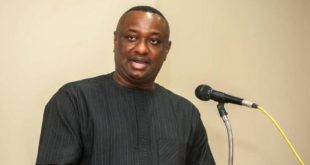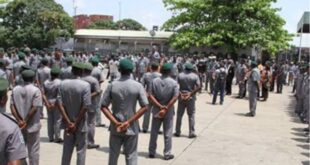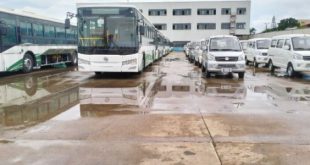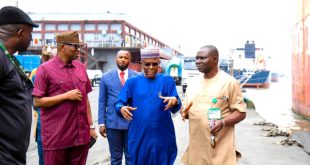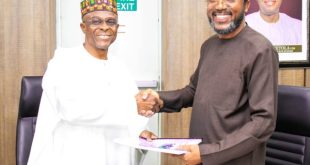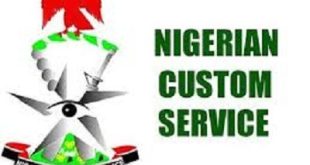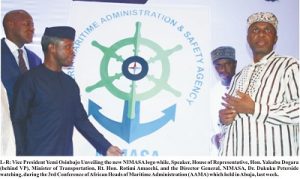 FG seeks regional collaboration to grow African maritime industry
FG seeks regional collaboration to grow African maritime industry- Aviation carved out of transport regulation
The leadership of the Nigerian Senate, the upper legislative chamber, has explained why it has not passed the National Transport Commission (NTC) bill which has since passed the second reading at the chamber in a swift concurrence with the House of Representatives which recently passed the bill.
Speaking in a separate interview with the MMS Plus in Abuja during the just concluded 3rd Conference of the Association of Heads of African Maritime Administration (AAMA), Senator Bala Naallah, Deputy Majority Leader, who represented the Senate President at the occasion, assured that the Senate would deliberate on the NTC this week, explaining why it had been difficult to cross the second reading stage.

Acknowledging that the Senate had set up committees to discuss and harmonize areas of conflict with related transport bills at the National Assembly, he said, “The committees have gone far with the works. The only problem we envisaged is having Aviation that is internationally regulated by the civil aviation authority to come under the NTC regulation. It is impracticable. Where we are at the moment is on the need to leave aviation on its own because of its sensitivity as an internationally regulated industry which all member countries must conform with. So, one of the requirements is that you must have an independent regulatory body which we have as the Nigerian Civil Aviation Authority (NCAA). So, any attempt to bring it under any other banner will amount to a clear breach of the international regulation. So, we do not want to be the one singing a different tune at international fora.” He added.
However, he said that “By Wednesday next week(this week) the Senate Committee on Transport will submit its report on the NTC bill which has passed the second reading stage”.

Recall that the House of Representatives has passed the NTC bill for an Act to establish an independent multimodal transport sector regulator. The bill, which is now up for concurrence in the Senate, would transmute the Nigerian Shippers’ Council (NSC) into NTC and transfer the staff, employees, ownership of land, assets, properties, rights, debts, liabilities, obligations, functions and powers currently vested in the NSC to NTC.
Essentially, the main objective of the bill is “to provide efficient economic regulatory framework for the transport sector, mechanism for monitoring compliance of government agencies, transport services providers and users in the regulated transport industry with relevant legislation and to advise government on matters relating to economic regulation of the regulated transport industry.”
The bill, prepared by Chairman, House Committee on Land Transport, Hon. Aminu Sani Isa, and sponsored by Hon. Osai Nicholas Osai had identified critical areas requiring urgent reforms to reposition the sector and add value to the economy.
It argued that though one of the cardinal objectives of the transport sector reforms introduced by the federal government was to bring about efficiency in the area of service delivery and reduce cost of doing business in the industry, charges have however, continued to increase, thereby forcing many transport users to take their businesses to rival ports in the West African Sub-region, with consequent massive revenue losses to our nation.
Speaking on the transformation of NSC to NTC, Isa said: “It was highly observed that the thrust of the NTC Bill is economic regulation. To a great extent this is also the main thrust of the NSC Act. For example, section 6 (1) (b), (c), and (h) of the draft NTC Bill 2015, and section 3 of the NSC Act, Cap N133, LFN 2004 have similarities of functions.”
He said: “The NSC has since its creation in 1978, established national spread and accompanying assets including a 12-storey twin towers that serves as its head office complex in Lagos, a four-storey two wings liaison office complex in Abuja, well-equipped Library, and an expansive training room as well as a fleet of operational vehicles;
“The council also has six zonal offices in the six geo-political zones as well as area and port offices spread across the states of the federation; by virtue of its experience and the fact that it has been performing similar economic regulatory functions in the port sub sector of the transport industry, the council is most suitable and easily adaptable to perform the role of an economic regulator.”
The transformation is also aimed at cost saving, avoidance of duplication of agencies and easy adaptability among others.
Meanwhile, President Muhammadu Buhari has called for improved synergy and collaboration among African countries to effectively attain a sustainable use of Africa’s Oceans and Seas.
Declaring open the 3rd Conference of the AAMA in Abuja, last week,Buhari advised Maritime Administrators across the continent to continually work together in building strong maritime economies.
The President who was represented by Vice President, Prof. Yemi Osinbajo (SAN) noted that the Federal Government had paid significant attention to making the Nigerian maritime business environment a much friendlier one, adding that the immediate priority in this regard is the entry and exit of goods especially in Nigerian seaports to increase efficiency of Nigerian Ports and enable quick turnaround time of vessels.
In his words, “We recently approved a new maritime security architecture and infrastructure to be jointly coordinated by NIMASA, National Security Adviser and Federal Ministry of Transport. We have given required support to the Navy so that they can work with others within our sub region to effectively police our waters for trade. This arrangement will also contribute to resolving and eliminating piracy and sea robbery in our maritime domain”
President Buhari also noted that with the vision of AAMA, Africa is on the right path by using collaborations and synergy to develop the African maritime sector beginning from the National level, regional, sub regional and continental level.
The President also announced that the Federal Government had approved the maritime security architecture and infrastructure which is to be jointly coordinated by the Nigerian Maritime Administration and Safety Agency (NIMASA), the Ministry of Transport and the National Security Adviser’s Office.
The measures that we are putting in place are designed to improve the efficiency of our ports and to enable quick turnaround time of vessels. Technology is also been deployed to make our port operations more transparent and effective in support of economic growth. NIMASA, which is the regulatory agency of shipping and maritime activities in Nigeria is been reformed so that it can play its expected role as a facilitator of economic prosperity.
The Minister of Transportation, Rt. Hon. Rotimi Amaechi in his speech said that Africans could not allow the international partners set and champion an agenda for the African continent. He noted that Africa’s seas should contribute significantly to the economic and environmental needs of the continent. He charged members of AAMA to lead the way and outline a vision
While calling on other African countries to support Nigeria’s quest to return to category C of the IMO, he disclosed that Nigeria has ratified 35 IMO Conventions, gazetted 34 maritime regulations, while several other maritime conventions are at different stages of being either domesticated or ratified. He added that Nigeria has stepped up efforts to make the country a deserved maritime hub by embarking on comprehensive port reforms, digitalization of all processes in the sector, upgrading port infrastructures and linking it to the rail network.
“What we require to move Africa forward is a concerted and co-operative spirit amongst African. That is why it is imperative that maritime administrators and regulators conference of this nature becomes regular to forge needed partnership.” He said.
The Director General of the Nigerian Maritime Administration and Safety Agency(NIMASA), Dr. Dakuku Peterside noted that Nigeria was delighted to host the 3rd AAMA Conference after the first in Mombasa, Kenya and the second in Sandton, South Africa. While noting that Nigeria accounts for over 60% of the total seaborne traffic in volume and value in West and Central Africa region, he added that the country is determined to advance African Maritime prosperity.
According to him, “It is no coincidence that this conference of maritime administrators and stakeholders is coming two years after African Leaders through the African Union subscribed to seven (7) key aspirations encapsulated in the Agenda 2063 at Addis Ababa, Ethiopia in January 2015 and three years after the adoption of Africa Integrated Maritime Strategy (AIMS) 2050.”
To further reinforce the critical role maritime can play in the development of Africa, the African Union (A.U.) special summit of heads of government on maritime security, safety and development in Lome, Togo, 15th October, 2016 aligned with us by adopting a Charter on Maritime Security, Safety and Development aimed at making Africa’s maritime space the key driver of the continent’s socio-economic development. This document was endorsed by 43 out of 54 African nations.
AAMA, inspired by African Union maritime transport charter provides us, as stakeholders in maritime sector, a platform to give effect to the various charters adopted by our heads of government whether AIM 2050, Agenda 2063 or Lome charter.
 MMS PLUS NG – Maritime, Aviation, Business, Oil and Gas News Online Newspaper with coverage in Maritime, Oil and Gas, Aviation, Power and Energy as well as Financial News
MMS PLUS NG – Maritime, Aviation, Business, Oil and Gas News Online Newspaper with coverage in Maritime, Oil and Gas, Aviation, Power and Energy as well as Financial News




